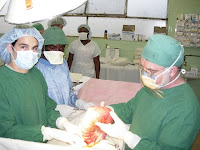Having lived in Angola for many years in the'90s, I witnessed firsthand how the country's healthcare infrastructure and system was decimated by the multi-decade civil war. Before the war, the infrastructure of some 700 country-wide clinics developed by the Portuguese was reduced during wartime to a few major hospitals functioning in the major cities. Though it is now some 7 years now since the civil war has ceased, roughly 50% of Angolans do not have access to healthcare. The CEML Hospital is filling this need in the southern part of the country.
The state of Angola’s health care system is especially detrimental for children who suffer in large numbers from tetanus, measles, whooping cough and meningitis; among others, malaria is especially deadly, as this disease causes approximately 50 percent of deaths in children under the age of five.
Most people coming to CEML are extremely poor, and have virtually no other access to medical care. Many suffer from chronic diseases such as hypertension and rheumatic fever. Malaria is very common, as is TB and schistosomiasis, diarrhoeal disease, respiratory disease, parasitic infections, trauma, and nutritional deficiency disease.
Being staffed by very skilled Canadian surgeons and possessing one of the more advanced operating rooms in the region, the hospital receives many of the more complicated surgical cases that are not possible to be performed elsewhere; many fistula operations, complicated pregnancy and abdominal cases, as well as dealing with trauma incurred from landmines and accidents. Shortly, CEML will embark on building project to add a state-of-the-art ICU unit, the only one in the region, to deal with the more urgent and urgent medical needs. Currently, some of the more serious cases requiring ICU care are transferred/medivaced to hospitals in the neighboring countries of Namibia and South Africa.

biotech corporation - Very interesting post. I really enjoy to read this awesome blog post.
ReplyDelete